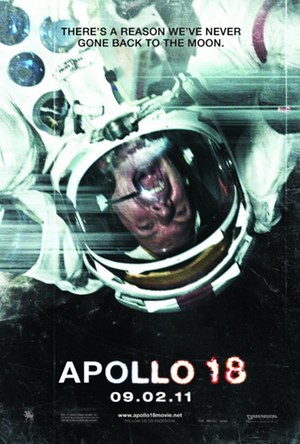Review: Apollo 18by Jeff Foust
|
| What’s gotten some people into a tizzy is that the movie purports to be something of a documentary. |
That’s the unlikely premise of Apollo 18, a film that opened in theaters this past weekend. In late 1974, long after the real Apollo 18 mission had been cancelled (along with Apollos 19 and 20), Apollo 18 is launched on a secret mission to the Moon. (Since even the movie’s producers acknowledge that it is extremely difficult to launch a Saturn V without anyone noticing, the film mentions a cover story that the rocket is launching an unmanned military payload.) The mission’s purpose, the crew is told, is to land near the Moon’s south pole to install some kind of early-warning sensors for the military. (The astronauts don’t appear to question the fact that the lunar south pole is a lousy place to track missiles, or, even if it wasn’t, the same sensors could be deployed by robotic landers; they’re just thrilled they’re going to the Moon, even on a secret mission.) Of course, there’s more to the mission than deploying sensors, and without spoiling the movie, they involve Soviet landers, other conspiracies, and—you guessed it—aliens.
What’s gotten some people into a tizzy is that the movie purports to be something of a documentary. The film’s opening credits claims that the movie is based on 84 hours of film of the “mission” posted to the Internet earlier this year. The entire movie consists of such footage, from pre-launch preparations to various camera angles inside the lunar module and handheld cameras by the spacewalking astronauts, with some stock NASA footage thrown in for good measure. (Apollo 18 is part of the growing genre of “found footage” films made famous over a decade ago by The Blair Witch Project.) NASA has gone so far as to distance itself from the picture, with one agency official telling the Los Angeles Times last week that the space agency was only “minimally involved” in the film. Anyone who actually believes the film is a documentary, though, should stick around for the credits: if the cast of actors playing the roles of astronauts and others as well as the extensive list of crew members isn’t proof enough, there’s the disclaimer at the very end that the events portrayed in the film are fictitious.
The film, in its quest to appear realistic, does take pains to get some of the technical details accurate. The lunar lander, the spacesuits, the rover, and even some of the more technical dialogue has the look and feel of footage from an actual Apollo mission and not something shot on a soundstage in Vancouver. Gerry Griffin, who served as lead flight director for several Apollo landings, was a technical advisor for the movie and declared its technical accuracy “pretty darn good” in an interview with collectSPACE. (The producers’ quest for verisimilitude apparently extended beyond technical accuracy: like a lot of NASA missions, Apollo 18 suffered from a launch delay, as it was previously slated for release in the spring.)
| Yes, a few confused or gullible viewers might walk away from the movie thinking that it does depict real events, but at least they’ll believe that we went to the Moon in the first place. |
The problem with Apollo 18 is not with trying to pass itself off as a depiction of actual events. No, the problem with the movie is that it’s not that good. While the film is not terribly long—barely 80 minutes until the closing credits begin to roll—at times it appears to drag on without building up much tension. It takes a long time for much of anything to happen, and, thanks to the trailers released in advance of the film, much of what might be considered plot twists or surprises have pretty much already been given away. The dialogue, when not reasonably accurate technobabble, is trite and predictable. In short, it’s just not that entertaining.
Some worry that Apollo 18 will further warp the real history of humanity’s first missions to the Moon; as the sci-fi blog io9 warned last week, “Will conspiracy flick Apollo 18 break the internet?” (The Internet will probably handle this movie just fine, although bloggers writing hyperbolic headlines in a desperate bid for pageviews might end up bruising it.) Yes, a few confused or gullible viewers might walk away from the movie thinking that it does depict real events, but at least they’ll believe that we went to the Moon in the first place, unlike some other conspiracy theorists. Most, though, will simply leave the theater wondering what the big fuss was all about.
